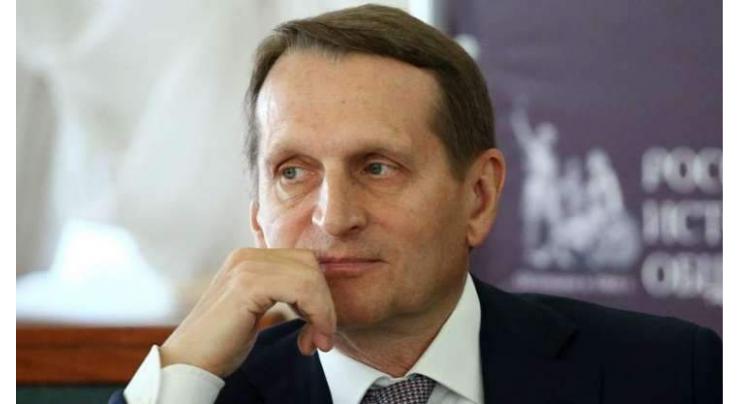
Security Principles Set In Post-WWII Era Remain Relevant - Russian Intelligence Chief
Umer Jamshaid Published October 21, 2019 | 09:54 PM

The principles of the international security established during the 1945 conferences between the Soviet Union, the United States, and the United Kingdom in Yalta and Potsdam are as relevant as ever, Russian Foreign Intelligence Service Head Sergey Naryshkin said on Monday
His article on the issue was published earlier in the day in the Serbian Evening news newspaper. It was dedicated to the 75th anniversary of Belgrade's liberation from the Nazi occupation.
"The end of the XX century, which turned out to be a geopolitical tragedy for both Serbia and Russia, is a clear example of a high price that one has to pay for remaking borders and reformatting particular elements of the world order," Naryshkin wrote.
According to Naryshkin, the last 20 years were marked by the US' failed attempts to create a unipolar world, which, however, did not weaken the system created by the end of the Second World War.
"On the contrary, the basic principles of the Yalta-Potsdam system has never been as relevant as in our world, which gravitates toward multiparty," he added.
The Russian intelligence chief praised Moscow for its role in global politics.
"In this world, Russia is once again one of the leading power centers. Today, our country is distinguished by firm values, powerful military potential, iron-clad political will and readiness to act decisively in the international arena. We are once again ready to stand for ourselves, and our friends and allies," he concluded.
The Yalta-Potsdam system was created by the end of WWII and defined the post-war international order. It was guaranteed by the separation of spheres of influence between the US and the USSR. Following the collapse of the latter, Washington attempted to unite the world behind itself, which lead to such humanitarian catastrophes as the bombing of former Yugoslavia, and wars in Iraq and Afghanistan.
Related Topics
Recent Stories

Delegation of international investors meets Finance Minister

Federal Govt stands with Balochistan for its development: Naqvi

UAE President receives condolences of Prime Minister of Pakistan over passing of ..

ECC approves to enhance wheat procurement targets

UN urges Israel to 'stop escalation' as tanks enter Gaza's Rafah city

EU stumps up $125 mn for Yemen after aid groups' plea

Governor Tessori condemns May 9 riots, calls it a 'pre-planned conspiracy'

PM condoles with UAE President over Sheikh Tahnoun’s death

Milan nets Giro 4th stage, Pogacar retains lead

UBS back in profit after Credit Suisse takeover losses

Asiya Gul lauds Shafaat's services as DG LG

President for dialogue with all political forces in Balochistan
More Stories From World
-
Ramos joins Mbappe and Dembele in PSG attack against Dortmund
37 minutes ago -
Paris Saint-Germain v Borussia Dortmund Champions League starting line-ups
47 minutes ago -
Saudi transportation, logistic sector ready for smooth Hajj pilgrimage
57 minutes ago -
Italy PM Meloni signs cooperation deals in Libya visit
57 minutes ago -
Brazilians queue for precious water as flood damage intensifies
1 hour ago -

UAE President receives condolences of Prime Minister of Pakistan over passing of Tahnoun bin Mohamme ..
2 hours ago
-

UN urges Israel to 'stop escalation' as tanks enter Gaza's Rafah city
1 hour ago -

EU stumps up $125 mn for Yemen after aid groups' plea
1 hour ago -

China voices serious concern over Israel's plan to launch military operation against Rafah
4 hours ago -

TikTok Pakistan Pavilion holds grand opening ceremony in Shanghai
3 hours ago -

Bazm-e-Urdu Dubai and Sharjah Children Reading Festival Present Entertaining Urdu Performances
4 hours ago -

UBS back in profit after Credit Suisse takeover losses
4 hours ago






